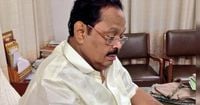In a significant development, the Madras High Court has ordered the framing of charges against Tamil Nadu Water Resources Minister Duraimurugan and several of his family members in connection with two separate cases of disproportionate wealth. This ruling, delivered by Justice P Velmurugan, has reignited scrutiny over the financial dealings of the senior DMK leader, who has been accused of amassing wealth that far exceeds his known sources of income.
The High Court's directive on April 23, 2025, concerns allegations that Duraimurugan accumulated wealth amounting to Rs 3.92 crore during his tenure as the Public Works Department Minister from 1996 to 2001. This decision came in response to revision petitions filed by the Directorate of Vigilance and Anti-Corruption (DVAC), which challenged a previous ruling by the Vellore Special Court that had discharged Duraimurugan and his relatives from the case.
The implicated family members include his wife D Santhakumari, brother Durai Singaram, son D M Kathir Anand—who currently serves as the Vellore Lok Sabha MP—and daughter-in-law K Sangeetha. The DVAC has been investigating these allegations since 2011, and the recent court orders mark a pivotal moment in the ongoing legal saga.
On April 24, 2025, just a day after the initial ruling, the High Court issued another order, this time concerning a different check period, focusing on allegations that Duraimurugan had amassed Rs 1.40 crore between 2007 and 2009. This case also involves his wife, and the court has mandated that the special court in Vellore conduct a day-to-day trial and resolve the matter within six months.
Justice Velmurugan's rulings have underscored the High Court's commitment to addressing corruption allegations against public officials, especially in light of the longstanding concerns regarding political figures and their financial transparency. The court's insistence on a swift trial reflects a broader effort to restore public trust in the political system and ensure accountability among elected representatives.
The backdrop of these legal proceedings is a complex history of political power within Tamil Nadu, where corruption allegations against politicians have often surfaced but frequently resulted in little consequence. Duraimurugan's case is particularly notable not only for the amounts involved but also for the high-profile nature of the accused, given his position in the ruling DMK party.
In February 2007, the Vellore Special Court had initially discharged Duraimurugan from the 2002 case registered under the Prevention of Corruption Act. However, the DVAC contested this decision, leading to the recent High Court directives. This reversal of the discharge order indicates a significant shift in the judicial approach to corruption cases involving politicians.
As the legal proceedings unfold, the implications for Duraimurugan and his family are profound. If found guilty, the consequences could be severe, impacting not only his political career but also the reputation of the DMK party, which has been striving to maintain its image amidst various controversies.
The timing of these rulings is also crucial, as they come at a moment when public scrutiny of political leaders is intensifying, particularly in the wake of several high-profile corruption cases that have surfaced in recent years. The public's demand for transparency and accountability is louder than ever, and the judiciary's actions may signal a willingness to respond to these calls.
Furthermore, the DVAC's persistence in challenging the discharge orders illustrates a determination to pursue justice in cases where public officials are suspected of corruption. This aligns with a broader trend in Indian politics, where anti-corruption agencies are increasingly empowered to investigate and prosecute cases against influential figures.
As the special court prepares to take up the cases, the focus will shift to the evidence presented and the arguments made by both the prosecution and the defense. Legal experts suggest that the outcomes will depend heavily on the strength of the evidence collected by the DVAC and how effectively it can demonstrate the alleged discrepancies between Duraimurugan's wealth and his known income sources.
In conclusion, the Madras High Court's recent rulings against Duraimurugan represent a significant moment in the ongoing battle against corruption in Tamil Nadu politics. As the cases progress, they will likely draw considerable public attention and could have lasting implications for the political landscape in the state.




